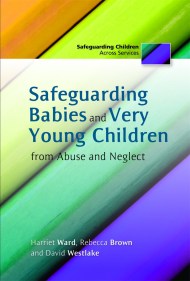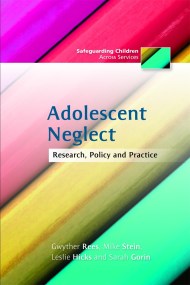Recognizing and Helping the Neglected Child
On sale
15th August 2011
Price: £27.99
Neglect is the most common form of child abuse, but recognizing the signs, assessing the family’s and the child’s needs, and undertaking intervention can be difficult and complicated.
This book, based on extensive research of the evidence, outlines how neglect can be recognized, examining the signs that parents give to signal their need for help, and the signs that a child’s needs are not being met. It then covers how practitioners should respond, including assessment, planning, and appropriate interventions. The authors examine whether practitioners are well-equipped to recognize child neglect, and whether professional responses to help could be swifter. Finally, the prevention of child neglect is considered, and a proposal for a public health approach and early intervention is outlined. The book includes case studies and makes recommendations for policy and practice.
This book will help practitioners to understand better child neglect and to improve practice in this important area. It will be vital for all those likely to encounter child neglect, including child and family social workers, health visitors, teachers with safeguarding responsibilities, nursery staff, and educational psychologists.
This book, based on extensive research of the evidence, outlines how neglect can be recognized, examining the signs that parents give to signal their need for help, and the signs that a child’s needs are not being met. It then covers how practitioners should respond, including assessment, planning, and appropriate interventions. The authors examine whether practitioners are well-equipped to recognize child neglect, and whether professional responses to help could be swifter. Finally, the prevention of child neglect is considered, and a proposal for a public health approach and early intervention is outlined. The book includes case studies and makes recommendations for policy and practice.
This book will help practitioners to understand better child neglect and to improve practice in this important area. It will be vital for all those likely to encounter child neglect, including child and family social workers, health visitors, teachers with safeguarding responsibilities, nursery staff, and educational psychologists.
Newsletter Signup
By clicking ‘Sign Up,’ I acknowledge that I have read and agree to Hachette Book Group’s Privacy Policy and Terms of Use
Reviews
One of the biggest strengths to this text is how it sparks the imagination, motivating creativity of response to situations of neglect... I personally was left with the hope-filled message that "it is possible to prevent child neglect" (p.160)and the confidence to believe the necessary systemic change might actually be achievable.
This book is strongly recommended for practitioners and as a resource for researchers.
This is a well rounded book, supported by many up to date research studies.
an excellent book. Indeed the comments made above essentially highlight the importance and complexity of the subject, and the authors rightly identify several areas as meriting more research. Jessica Kingsley are producing quite a flood of interesting texts at present, and they are to commended for publishing this book.
[T]his book is a most welcome and timely addition to the literature on child neglect. The authors write with assurance and understanding, recognizing how emotionally draining and professionally demanding the work can be; they also offer a challenge to current thinking and practice. This is a must-read book for all those whose work brings them in contact with neglected children, for their managers and those responsible for their training and education.








